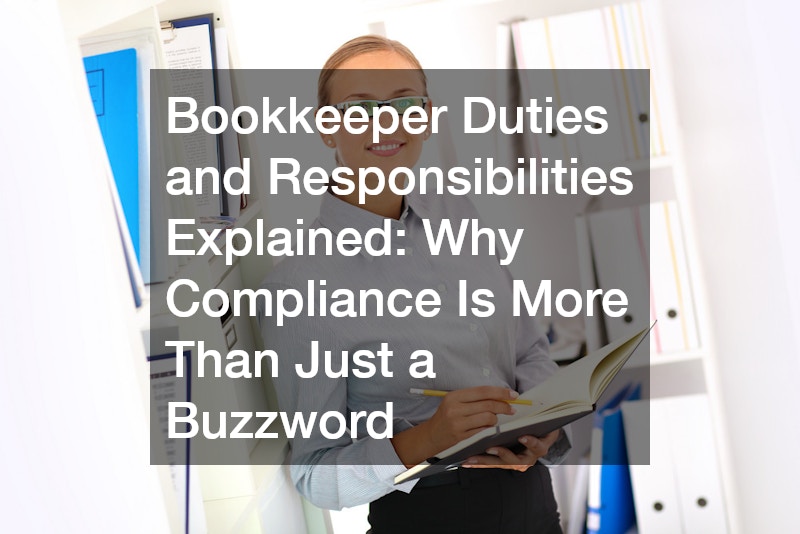

Bookkeeping is one of the most overlooked yet crucial functions in running a successful business. While many entrepreneurs prioritize sales, marketing, or product development, the foundation of any business’s financial health lies in accurate bookkeeping. At the core of bookkeeping is not just the act of recording numbers, but ensuring compliance with financial regulations, tax laws, and internal policies.
For business owners, failing to understand what a bookkeeper actually does can lead to poor decision-making, tax issues, and even legal trouble. On the other hand, understanding the duties and responsibilities of a bookkeeper—and their role in maintaining compliance—can result in smoother operations, better cash flow, and peace of mind during tax season.
In this comprehensive guide, we’ll explore the full scope of a bookkeeper’s role, why it matters, and how it supports long-term business success.
What Does a Bookkeeper Do on a Daily Basis?
Bookkeeping is more than just entering numbers into spreadsheets. It’s a day-to-day operation that keeps your business organized, financially healthy, and ready for compliance audits or tax filings. Whether you have an in-house bookkeeper or outsource the function, understanding the daily tasks involved helps you manage expectations and monitor performance.
Key Daily Tasks of a Bookkeeper
- Recording financial transactions: Every sale, purchase, payment, or expense is documented with accuracy.
- Updating ledgers and journals: These are vital for tracking income and expenses.
- Reconciling bank statements: Daily or weekly bank reconciliation ensures no discrepancies between business accounts and financial records.
- Tracking accounts payable and receivable: Ensures suppliers are paid on time and clients are invoiced and followed up.
- Monitoring cash flow: Daily monitoring allows early detection of cash shortages or surplus.
- Organizing receipts and financial documents: Digital and paper records are maintained for audits and tax purposes.
This daily routine forms the baseline of financial transparency and supports the company’s ability to meet all legal and regulatory standards.
How Are Bookkeeper Duties Different from Accounting?

Bookkeeping and accounting are often used interchangeably, but they serve different functions within a business. While both deal with the company’s finances, the scope, objectives, and responsibilities of each role vary significantly.
Bookkeeping vs. Accounting: Understanding the Divide
| Function | Bookkeeper | Accountant |
| Primary Focus | Recording transactions | Interpreting financial data |
| Duties | Data entry, reconciliations, and ledger management | Financial analysis, forecasting, and compliance reporting |
| Tools Used | QuickBooks, Xero, Wave | Excel, ERP systems, and specialized tax software |
| Qualifications | Often no degree required; experience-based | Usually, a CPA or a degree in Accounting |
| Reporting | Provides data for reports | Prepares and explains reports for stakeholders |
While bookkeepers handle the foundational tasks, accountants use this data for higher-level strategic decisions, tax planning, and ensuring long-term financial compliance.
Why Is Compliance a Core Function of Bookkeeping?
Compliance is not optional—it is a business imperative. From tax regulations to labor laws and industry-specific standards, businesses must follow a variety of rules. Bookkeepers play a crucial role in ensuring all financial records align with these regulations.
The Bookkeeper’s Role in Ensuring Compliance
Here’s how bookkeepers actively contribute to compliance:
- Tax Reporting: Accurate bookkeeping ensures all income and expenses are documented for quarterly or annual tax filing.
- Regulatory Adherence: Whether it’s sales tax, payroll taxes, or industry-specific financial rules, bookkeepers help maintain records that comply.
- Audit Readiness: Proper bookkeeping means the business is always ready for internal or external audits.
- Fraud Prevention: Regular reconciliations and checks can detect unauthorized transactions early.
- Data Security Compliance: With digital bookkeeping, compliance with data protection laws (e.g., GDPR, HIPAA) also becomes part of the bookkeeper’s scope.
Bookkeeping is the first line of defense against non-compliance penalties, interest charges, and legal repercussions.
Bookkeeper Duties and Responsibilities: A Full Breakdown
To truly appreciate the value a bookkeeper brings, let’s examine the role from a comprehensive perspective. This section dives into all major areas where bookkeepers contribute to business operations and compliance.
1. Financial Data Entry and Recordkeeping
- Entering daily transactions into accounting software
- Maintaining general ledgers
- Organizing source documents (invoices, receipts, bills)
- Creating digital backups for compliance and audit trails
2. Bank and Credit Card Reconciliation
- Comparing bank statements to internal records
- Identifying and resolving discrepancies
- Verifying deposits and withdrawals
- Ensuring credit card statements match expense reports
3. Payroll Support
- Recording employee wages and bonuses
- Ensuring payroll taxes are calculated and withheld accurately
- Coordinating with payroll providers to ensure on-time payment
- Assisting in the generation of year-end forms like W-2s or 1099s
4. Accounts Payable and Receivable Management
- Monitoring outstanding invoices
- Following up with clients for unpaid bills
- Managing vendor payments
- Preventing late fees or penalties through timely payments
5. Monthly and Quarterly Reporting
- Preparing profit and loss statements
- Updating balance sheets
- Generating cash flow statements
- Highlighting trends for better financial decision-making
6. Tax-Ready Financials
- Categorizing expenses in line with tax requirements
- Identifying deductible expenses
- Assisting accountants or tax advisors with documentation
- Keeping financial records aligned with IRS or local taxation office guidelines
7. Supporting Business Compliance
- Filing tax returns (in some cases)
- Keeping records for audits or regulatory reviews
- Adhering to state, federal, and industry-specific financial regulations
- Implementing internal controls to reduce the risk of fraud or error
By managing all of the above, bookkeepers help business owners maintain clean, transparent, and compliant financial records year-round.
How Can Bookkeepers Help Avoid Costly Compliance Penalties?
Mistakes in bookkeeping can cost your business thousands of dollars in penalties or lost deductions. Bookkeepers can help mitigate those risks with a proactive, compliance-focused mindset.
Common Compliance Pitfalls Bookkeepers Help Avoid
- Misreporting income: Underreporting or overreporting can trigger audits.
- Incorrect tax classification of workers: Leads to IRS fines.
- Failure to collect or remit sales tax: Results in back payments and penalties.
- Late payroll tax deposits: incur interest and penalties.
- Poor documentation: Leads to missed deductions and audit issues.
Proactive Measures Bookkeepers Take
- Keeping detailed and organized records
- Staying updated on tax code changes
- Coordinating with accountants or tax professionals
- Using accounting software that flags compliance issues
- Implementing month-end and quarter-end checklists
Bookkeepers essentially serve as compliance custodians who prevent minor errors from turning into legal liabilities.
What Should Business Owners Look for When Hiring a Bookkeeper?

Not all bookkeepers are created equal. As a business owner, you need someone who understands both the technical and compliance aspects of bookkeeping.
Traits of a Reliable and Compliance-Savvy Bookkeeper
- Attention to detail: Prevents data entry errors and oversights
- Up-to-date with regulations: Ensures proper compliance practices
- Experience with accounting software: Familiarity with QuickBooks, Xero, or FreshBooks is essential
- Communication skills: To report financial status and flag issues promptly
- Integrity: Bookkeepers handle sensitive financial data and must be trustworthy
- Problem-solving skills: Able to troubleshoot discrepancies and suggest improvements
Also, consider certifications such as:
- Certified Bookkeeper (CB)
- QuickBooks ProAdvisor
- Xero Certification
- NACPB or AIPB Membership
These show that the bookkeeper is serious about the profession and aware of current standards and regulations.
How Has Technology Changed Bookkeeper Duties and Compliance?
Modern bookkeeping has moved far beyond handwritten ledgers and Excel sheets. Technology has enhanced both accuracy and compliance in bookkeeping tasks, making it easier for businesses to manage their finances.
Digital Tools Enhancing Bookkeeper Efficiency
- Cloud Accounting Software: Tools like QuickBooks Online and Xero offer real-time updates and accessibility
- Automated Invoicing and Reminders: Reduces overdue receivables
- Bank Feeds: Automatically imports bank transactions, reducing manual entry
- Expense Tracking Apps: Employees can scan receipts from mobile apps
- AI-Powered Reconciliation: Speeds up the process and reduces human error
Tech and Compliance
- Audit Trails: Digital systems log every user action
- E-File Tax Returns: Streamlined tax compliance processes
- Secure Document Storage: Meets legal data retention standards
- Multi-factor Authentication: Secures sensitive financial data
Business owners should ensure their bookkeeper is tech-savvy and proficient in modern financial tools that support compliance efforts.
When Should You Outsource Bookkeeping for Better Compliance?
For many small to mid-sized businesses, outsourcing bookkeeping makes strategic and financial sense. Especially when compliance is a concern, outsourcing to professionals can reduce risk.
Benefits of Outsourcing Bookkeeping
- Access to trained professionals: Keeps you aligned with laws and tax codes
- Scalability: Adjust services based on business needs
- Cost-efficiency: No need to hire full-time staff with benefits
- Risk reduction: External firms often have compliance review processes
Consider Outsourcing If:
- You’re falling behind on tax filings or reporting
- You’re audited frequently
- Your in-house staff lacks financial expertise
- You’re expanding to new regions with different tax laws
- You want to focus on business growth rather than financial admin
Just ensure the firm you hire has strong compliance standards, cybersecurity practices, and positive client reviews.
How Bookkeeping Supports Long-Term Financial Strategy and Business Growth
While compliance is a critical component of bookkeeping, its value doesn’t end there. Accurate, up-to-date financial records provide the foundation for strategic business planning. Bookkeepers supply the data business owners need to make informed decisions about growth, investments, and operational improvements. In this way, bookkeeping serves not only to meet regulatory requirements but also to build financial clarity and direction.
Strategic Advantages of Solid Bookkeeping:
- Accurate forecasting: Historical data helps predict future revenue and expenses.
- Cash flow planning: Bookkeepers provide insights into when to scale up or cut back.
- Investor readiness: Clean financial records are essential for securing loans or funding.
- Operational efficiency: Bookkeeping highlights overspending or inefficiencies.
- Budgeting: Enables realistic and informed budget creation and adjustments.
Without reliable financial data, strategic planning becomes guesswork. A knowledgeable bookkeeper ensures your financial roadmap is built on a solid, compliant foundation, empowering smarter growth decisions.
Conclusion: Why Bookkeeping and Compliance Go Hand in Hand
Bookkeeping is no longer just about data entry—it’s about ensuring that your business stands on solid legal and financial ground. In today’s complex regulatory environment, compliance isn’t a buzzword. It’s a non-negotiable part of running a sustainable and successful business. Whether you manage books in-house or outsource, understanding the full scope of bookkeeper duties and responsibilities empowers you as a business owner to make informed decisions, prevent costly errors, and drive long-term growth.
Ultimately, your bookkeeper is your first line of defense against non-compliance and financial instability. Invest in the right people and systems, and your business will be better equipped to thrive.

